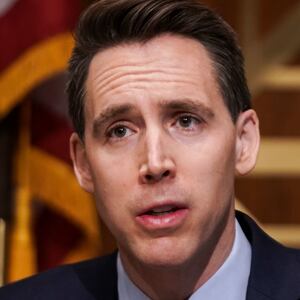A majority of Republican Sen. Josh Hawley’s constituents in Missouri believe he should resign after he led the effort to object to the 2020 election result after the Jan. 6 insurrection at the U.S. Capitol, according to a new poll from Data for Progress, the liberal polling shop.
The Data for Progress survey, shared exclusively with The Daily Beast, finds that 51 percent of likely voters polled in Missouri believe Hawley should resign, while 49 percent do not. One in five Republicans surveyed were in favor of the freshman senator’s resignation, while a majority of self-identified independents and a supermajority of Democrats were also in favor.
Asked how Hawley’s opposition to the certification of the Electoral College might influence their vote going forward, 47 percent of respondents said they would be less likely to vote for Hawley when he is up for reelection in 2024, while 36 percent said they were more likely to vote for him after the gambit.
The poll also found Hawley’s approval rating underwater, with 43 percent of respondents disapproving of him and 39 percent approving. One-third of respondents had a “very unfavorable” view of Hawley, while one in five had a “very favorable” view of him.
Data for Progress surveyed 571 likely voters in Missouri from Jan. 10 to Jan. 12, the weekend after a pro-Trump mob stormed the Capitol to overthrow the election results. The margin of error was 4.1 points. The firm, which FiveThirtyEight calculated to have no partisan bias in either direction, was the first to survey Missouri voters about Hawley’s actions on Jan. 6. The poll was commissioned by the liberal group MoveOn.
A national survey on Hawley, conducted by the firm Ipsos in conjunction with Axios and released on Thursday, found that 24 percent of respondents had a favorable view of him, and 68 percent had an unfavorable view—a 44-point difference. Hawley’s favorability even lagged among Republicans, with more of them disliking than liking him by a three-point margin.
The ambitious conservative senator was first elected in 2018, when he defeated former Sen. Claire McCaskill (D-MO) by a margin of 51.5 percent to 45.5 percent in this increasingly conservative state, which Donald Trump carried by 15 points in November.
Hawley is next scheduled to face Missouri voters in 2024—the same year as the presidential election in which he is considered a likely candidate. He has aggressively courted Trump’s base with socially conservative and economically populist ideas and, along with Sen. Ted Cruz (R-TX), spearheaded a last-ditch attempt to turn Congress’ perfunctory role in certifying the election into an opportunity to litigate Trump’s claims of election “fraud” that had been roundly rejected by courts and election officials.
The morning of Jan. 6, Hawley was photographed raising his fist in solidarity with a pro-Trump crowd gathered outside the Capitol. Hours later, after the violent mob broke into the building and attempted to disrupt the election certification, threatening lawmakers, staff, reporters, and even Vice President Mike Pence with harm and death, Hawley took to the Senate floor to say that the violence had made “lawful” contesting of the election even more important.
Hawley’s play may have been miscalculated, said Ethan Winter, a Data for Progress analyst—he “took a position that appears to have enraged many Independents and even some members of his Republican base,” which Winter says “closely coordinates with recent dips in President Trump's national favorability amongst Independent and Republican voters.”
Afterward, several of Hawley’s Democratic colleagues called on him to resign—a rare sight in the normally genteel Senate. The two major newspapers in Missouri also called for his resignation, and several powerful corporate interests, including those based in the state, declared they would suspend contributions to his campaigns or even ask for their money back.
Increasingly isolated in his party and in Washington, Hawley has insisted he was only reflecting the will of Missouri voters. His allies have backed him up on that score: “Hawley has his finger on the pulse of the Missouri electorate much better than a lot of the people who are criticizing him now, and I think they need to be realistic with themselves about that,” Gregg Keller, a GOP operative in the state, told The Wall Street Journal last week.
Though Trump’s approval rating has hit new lows nationally—it landed at 34 percent in the most recent POLITICO/Morning Consult poll, the lowest ever in four years—it has proven somewhat durable in pro-Trump Missouri, and the outgoing president remains far more popular than the senator who has zealously supported him.
According to the Data for Progress survey, 48 percent of Missouri voters approved of Trump’s performance, and 51 percent disapproved, days after he incited a violent riot and said he loved the people carrying out destruction at the U.S. Capitol. Eighty-three percent of Republicans continued to have a favorable view of Trump, according to the survey.







